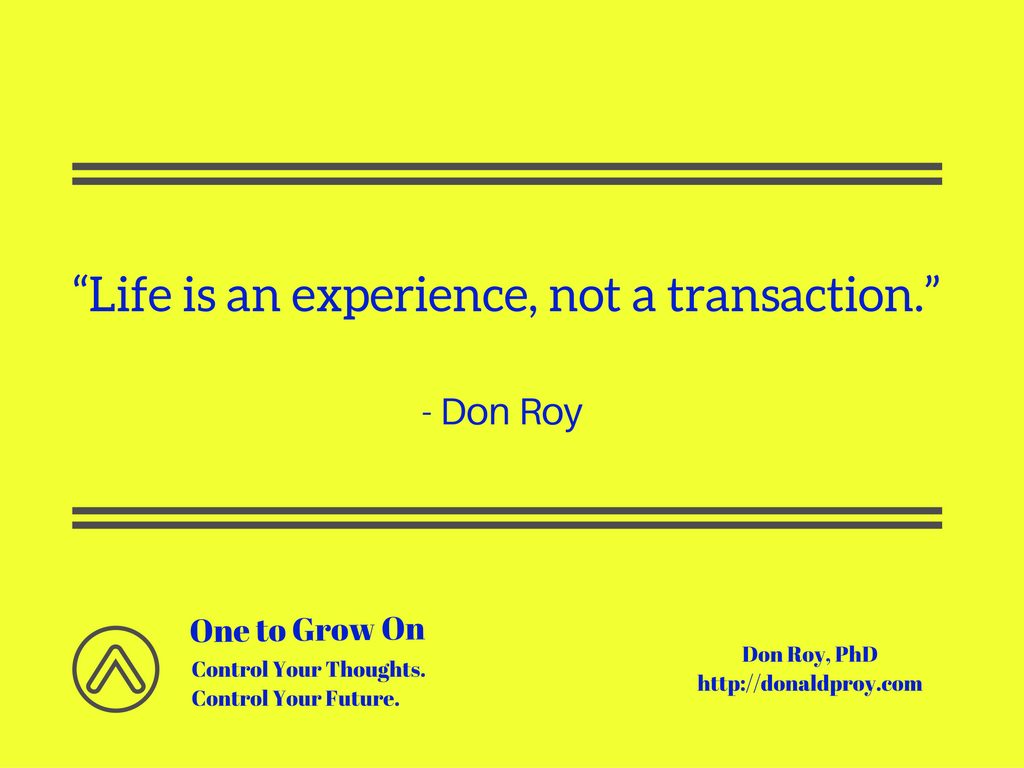I have been teaching in higher education for twenty years. It has been incredibly rewarding and truly a life changing experience. At the same time, it has frustrated me in some ways. The main source of frustration is a sense that many students miss out certain elements of value that attending college offers. Oh sure, they (usually) follow the list of prescribed courses that when completed will make them eligible to graduate. They check off their requirements like a to-do list. When all of the items on the list are checked off, they receive their diploma and move on.
The scenario I described plays out often at my university and virtually every other one. Many students lock in on completing the transaction that is a degree program and miss out on benefits that other elements of the college experience entails. I feel a sense of sadness for them. At the same time, their focus on the transaction opens my eyes to the fact I do the same thing in certain aspects of my work and life. Life is an experience, not a transaction. We must be open to having experiences while in the process of completing the transaction.
A Transaction Mindset
Completing transactions versus enjoying experiences is not an either-or proposition. Some aspects of our lives are suited for transaction consumption. For example, the process of fueling your car with gasoline has been reduced to a transaction. You pull up to the fueling station, make a payment (probably to a machine without having human interaction), pump the gas you bought, and leave the station. The added value that was once a staple of a full-service gas station now can be received elsewhere (an oil change service or a tire store) if not a do-it-yourself task. We do not seek an experience from every action we take… nor do we need to.
When we have a transaction mindset, the focus is on goal completion- fill the gas tank, cash a check, or get through a day of classes. We’re so fixed on the outcome that we can miss out on other sources of value (benefits). One of the greatest missed opportunities is building deeper relationships with the people around you. A transaction focus can prevent us from getting to know more about the people around us. For example, I recently learned that a lady at my church worked at my university for 29 years. I have known her for 16 years and spoken to her on many occasions, but I did not know this fact about her background. Her revelation served as a reminder that too many interactions with people are limited to transactions (e.g., greetings and small talk).
An Experience Mindset
Adopting a transaction mindset can help you accomplish what needs to be done. Unfortunately, it can occur at the expense of missing out on experiences that add perspective, bring joy, and become part of the stories of our life. Experiences add an extra layer of benefit, joy, or satisfaction to a task or transaction. In the world of brands, Starbucks and IKEA are renowned for the customer experience created. The transaction of buying coffee or shopping for furniture is transformed to a multi-sensory experience people will seek out and look forward to engaging.
In our daily lives, we do not need a Starbucks or IKEA to create experiences for us; they are there to be enjoyed if we will avail ourselves to them. I think back to my oldest son’s baseball team some twenty years ago. The team had to be the worst in terms of wins and losses for any sport team which our three sons ever played. One game was particularly brutal, with Chris’s team being on the wrong end of a 19-0 score. On the ride home, he blurted out from the back seat “that was a great game, wasn’t it?” My wife and I looked at each other with the same thought: Was he talking about the same game we just watched? He was because he found joy in the experience of playing baseball, regardless of the outcome of the game (transaction).
Move Beyond Transactions
This week, the goal is to not limit focus to transactions. Look for experiences that come with transactions to get more benefit and fulfillment from the daily steps taken in the journey.


